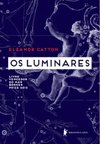Spartaco
Anton Bruckner - 200 anos do nascimento
Eleanor Catton é uma escritora neozelandesa nascida no Canadá em 1985 (Ontario, 24 de setembro de 1985) enquanto seu pai completava seu doutorado em uma universidade canadense. Catton cresceu em Christchurch após o retorno de sua família para Nova Zelândia quando ela tinha seis anos. Ela formou-se em Inglês na Universidade de Canterbury e completou um mestrado em Escrita Criativa no The Institute of Modern Letters da Universidade Victoria, em Wellington e foi bolsista do Iowa Writers’ Workshop.
Seu primeiro romance, The Rehearsal, de 2008 (lançado no Brasil como O Ensaio) foi bem recebido e incluído na "shortlist" para as premiações do Guardian First Book Award e Dylan Thomas Prize e também na "longlist" do Orange Prize. Segundo romance de Catton, The Luminaries (Os Luminares), foi publicado em 2013.
Ele foi indicado e, posteriormente, ganhou o Man Booker Prize desse mesmo ano, tornando-se a mais jovem vencedora dessa premiação, com a idade de 28 anos. Além disso, deve-se destacar que Os luminares é o trabalho mais longo a ganhar o referido prêmio em sua história (45 anos).
Seus dois livros foram muito bem recebidos pela crítica internacional, que a considera um dos grandes novos talentos literários de sua geração.
Atualmente Catton vive em Auckland com seu companheiro, Steven Toussaint, autor e poeta norte-americano, e ensina escrita criativa no Instituto de Tecnologia de Manukau.
Neste ano, Catton tornou-se membro da Ordem do Mérito da Nova Zelândia por seus serviços à literatura.


Os Luminares
Em 2013, o anúncio do vencedor do Man Booker Prize incluiu a notícia da quebra de dois paradigmas importantes. Aos 28 anos, a neozelandesa Eleanor Catton se tornou a autora mais jovem a conquistar o prêmio. Os luminares, seu segundo livro, é o romance mais longo já contemplado. A escrita de Catton é mais madura do que sua idade pode sugerir. A extensão da história não a torna maçante.
Catton constrói uma trama de intrigas ambientada na Nova Zelândia da segunda metade do século XIX. Diagramas astrológicos abrem cada uma das partes do romance, o que permite que os eventos sejam encaminhados a partir das posições estelares e planetárias ali determinadas. Uns poucos personagens (cada um associado a um corpo celeste) estão diretamente envolvidos com os acontecimentos centrais da trama. Do lado de fora do círculo - mais próximos do leitor, mas desempenhando papéis mais ou menos secundários no drama principal, estão doze homens (cada um associado a um signo zodiacal) que interferem, movidos por diferentes razões, na história em curso.
Essa maneira de ordenar os elementos contribui para distorcer a percepção do leitor, criando uma espécie de ilusão; assim, nas páginas iniciais deste romance, quem parece protagonista é mero coadjuvante.
FONTE: Wikipedia e http://www.livrosabertos.com.br/os-luminares-eleanor-catton/
Seu primeiro romance, The Rehearsal, de 2008 (lançado no Brasil como O Ensaio) foi bem recebido e incluído na "shortlist" para as premiações do Guardian First Book Award e Dylan Thomas Prize e também na "longlist" do Orange Prize. Segundo romance de Catton, The Luminaries (Os Luminares), foi publicado em 2013.
Ele foi indicado e, posteriormente, ganhou o Man Booker Prize desse mesmo ano, tornando-se a mais jovem vencedora dessa premiação, com a idade de 28 anos. Além disso, deve-se destacar que Os luminares é o trabalho mais longo a ganhar o referido prêmio em sua história (45 anos).
Seus dois livros foram muito bem recebidos pela crítica internacional, que a considera um dos grandes novos talentos literários de sua geração.
Atualmente Catton vive em Auckland com seu companheiro, Steven Toussaint, autor e poeta norte-americano, e ensina escrita criativa no Instituto de Tecnologia de Manukau.
Neste ano, Catton tornou-se membro da Ordem do Mérito da Nova Zelândia por seus serviços à literatura.


Os Luminares
Em 2013, o anúncio do vencedor do Man Booker Prize incluiu a notícia da quebra de dois paradigmas importantes. Aos 28 anos, a neozelandesa Eleanor Catton se tornou a autora mais jovem a conquistar o prêmio. Os luminares, seu segundo livro, é o romance mais longo já contemplado. A escrita de Catton é mais madura do que sua idade pode sugerir. A extensão da história não a torna maçante.
Catton constrói uma trama de intrigas ambientada na Nova Zelândia da segunda metade do século XIX. Diagramas astrológicos abrem cada uma das partes do romance, o que permite que os eventos sejam encaminhados a partir das posições estelares e planetárias ali determinadas. Uns poucos personagens (cada um associado a um corpo celeste) estão diretamente envolvidos com os acontecimentos centrais da trama. Do lado de fora do círculo - mais próximos do leitor, mas desempenhando papéis mais ou menos secundários no drama principal, estão doze homens (cada um associado a um signo zodiacal) que interferem, movidos por diferentes razões, na história em curso.
Essa maneira de ordenar os elementos contribui para distorcer a percepção do leitor, criando uma espécie de ilusão; assim, nas páginas iniciais deste romance, quem parece protagonista é mero coadjuvante.
FONTE: Wikipedia e http://www.livrosabertos.com.br/os-luminares-eleanor-catton/

